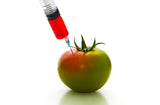Organic Cultivation
What is Organic?
"A production system that sustains the health of soils, ecosystems and people. It relies on ecological processes, biodiversity and cycles adapted to local conditions, rather than the use of inputs with adverse effects. Organic agriculture combines tradition, innovation and science to benefit the shared environment and promote fair relationships and a good quality of life for all involved.”
- International Foundation of Organic Agriculture (IFOAM)
Organic agriculture recognizes that what we eat affects our health. Simply put, we are what we eat! Organic is more than planting without harmful chemical fertilizers and pesticides. Organic farming:

- requires farmers to develop nutrient rich soil to grow strong healthy crops
- prohibits the use of drugs, antibiotics, preservatives, artificial colors and flavors
- bans production and use of Genetically Modified Organism (GMO)
- restores environmental health and ecological harmony
- preserves biodiversity and wildlife
- prohibits animal cruelty
IFOAM, the leading body in organic agriculture, has established the 4 principles of agriculture, which apply to the way people interact with living landscapes, relate to one another and shape the legacy of future generations:
Organic Agriculture should sustain and enhance the health of soil, plant, animal, human and planet as one and indivisible.
This principle points out the interdependence of the health of ecosystems and the health of humans. It is impossible to separate them because healthy soils produce healthy crops that nurture the health of animals and people.
The role of organic agriculture is to enhance the health of ecosystems, from the smallest in the soil organisms to human beings. In order to produce high quality, nutritious food that contributes to preventive health care and well-being, the use of fertilizers, pesticides, animal drugs and food additives that may have adverse health effects is avoided.
Organic Agriculture should be based on living ecological systems and cycles, work with them, emulate them and help sustain them.
Organic farming should fit the cycles and ecological balances in nature. It should attain ecological balance through the design of farming systems, establishment of habitats and maintenance of diversity, and protect and benefit the common environment including landscapes, climate, habitats, biodiversity, air and water.
Organic Agriculture should build on relationships that ensure fairness with regard to the common environment and life opportunities.
Fairness is characterized by equity, respect, justice and stewardship of the shared world, both among people and in their relations to other living beings. Organic agriculture should provide everyone involved with a good quality of life, while animals should be treated accordance to their physiology, natural behavior and well being in mind.
Organic Agriculture should be managed in a precautionary and responsible manner to protect the health and well being of current and future generations and the environment.
Organic agriculture wants to ensure that organic agriculture is healthy, safe and ecologically sound. Only appropriate developments in new technologies to enhance and increase efficiency should be adopted and reject those with unpredictable ones with significant risks such as genetic engineering.
Benefits of Organic Farming
“Organic food is more nutrient-dense for your body. It is 25% more nutrient dense, on average, than their conventional food counterparts. That means they deliver more essential nutrients per serving or calorie consumed than conventionally-grown foods.”
-a review of 100 nutritional studies by The Organic Center
 Many people want to know the health benefits of eating organic. So is organic food better for you? Definitely, YES! Many studies have shown that organic food is more nutrient-dense, and it helps to increase one’s intake of vitamins, minerals, and anti-oxidants. A groundbreaking review of nearly 100 nutritional studies by The Organic Center published in March 2008 confirms that organic plant-based food is more nutrient-dense for your body. It:
Many people want to know the health benefits of eating organic. So is organic food better for you? Definitely, YES! Many studies have shown that organic food is more nutrient-dense, and it helps to increase one’s intake of vitamins, minerals, and anti-oxidants. A groundbreaking review of nearly 100 nutritional studies by The Organic Center published in March 2008 confirms that organic plant-based food is more nutrient-dense for your body. It:
- has higher levels of eight of 11 nutrients studied, including significantly greater concentrations of health-promoting polyphenols and antioxidants.
- is 25% more nutrient dense, on average, than their conventional food counterparts. That means they deliver more essential nutrients per serving or calorie consumed than conventionally-grown foods.
A co-author of this report, Neal Davies, a professor at Washington State University (WSU) further states that nutrients present in organic foods are, “in a more biologically active form.”
On the other hand, official food composition tables, including data compiled by the US Department of Agriculture, reveal that since the 1940s the mineral levels in fruits, vegetables, meat and dairy have declined substantially in conventional foods. Artificial fertilizers used in conventional foods produces “blossoming” growth by swelling produce with more water, diluting not only the nutrients, but taste and aroma as well. Combine this with unripe harvesting, longer storage processing, and it's not surprising that we may be getting less nutrients in our food than we were decades ago.
 Eating organic definitely keeps away harmful pesticides out of the food we eat and beverages we drink that endanger our health. Long before extensive research on the health risk of pesticides, US Environmental Protection Agency (EPA) has approved many types of pesticides. Now, the EPA considers 60% of all herbicides (weed killers), 90% of all fungicides (mold killers), and 30% of all insecticides (insect killers) as harmful and cancer causing. They recognize that pesticides can cause many health problems, such as such as birth defects, nerve damage, cancer, and many unknown effects might occur only over a long period of time. Emerging research shows when you eat different types of conventional foods, you are consuming a combination of various pesticides, producing “cocktail effect”, synergizing toxicity of up to 100-fold.
Eating organic definitely keeps away harmful pesticides out of the food we eat and beverages we drink that endanger our health. Long before extensive research on the health risk of pesticides, US Environmental Protection Agency (EPA) has approved many types of pesticides. Now, the EPA considers 60% of all herbicides (weed killers), 90% of all fungicides (mold killers), and 30% of all insecticides (insect killers) as harmful and cancer causing. They recognize that pesticides can cause many health problems, such as such as birth defects, nerve damage, cancer, and many unknown effects might occur only over a long period of time. Emerging research shows when you eat different types of conventional foods, you are consuming a combination of various pesticides, producing “cocktail effect”, synergizing toxicity of up to 100-fold.
Organic agriculture also prohibits the use of many post-harvest chemical additives- such as preservatives, artificial sweeteners, colorings and flavorings, MSG, hydrogenated fat, phosphoric acid, and antibiotics in animal feed, which are routinely used in conventional farming.
Hawaiian researchers following 8,000 people for 34 years have found that increasing consumption of conventional fruits and juices increase the risk of Parkinson's disease. Israeli researchers have linked many symptoms such as headaches, tremor, lack of energy, depression, anxiety, poor memory, dermatitis, convulsions, nausea, indigestion and diarrhea with the intake of pesticides. Belgian research has found that women diagnosed with breast cancer are six to nine times more likely to have the pesticides DDT or hexachlorobenzene in their bloodstreams compared to women who did not have breast cancer.
Children need the most protection from harmful chemicals due to their immature and developing organs, brains, and immune systems. Because they have a larger intake of food per kilo of body weight, children are even more susceptible to toxins than adults. Increased exposure to pesticides can lead to underdevelopment of their motor and mental abilities, and an increase in aggressive behavior.
 Because organic farming takes care of its environment and builds fertility of the soil, the plant grows stronger and healthier! The produce oozes with more taste and aroma. Try an organic fruit an experience the explosion of flavors in your mouth. Chemicals interfere with the natural taste of food grown with conventionally. Usually, there is less aroma, and a more salty and bitter aftertaste.
Because organic farming takes care of its environment and builds fertility of the soil, the plant grows stronger and healthier! The produce oozes with more taste and aroma. Try an organic fruit an experience the explosion of flavors in your mouth. Chemicals interfere with the natural taste of food grown with conventionally. Usually, there is less aroma, and a more salty and bitter aftertaste.
 Certified organic food meets stringent standards to assure you from “farm to fork”, your food has been handled according to strict procedures. You can be rest assured that the product, its ingredients, and its processing has been thoroughly inspected and is continuously monitored.
Certified organic food meets stringent standards to assure you from “farm to fork”, your food has been handled according to strict procedures. You can be rest assured that the product, its ingredients, and its processing has been thoroughly inspected and is continuously monitored.
 Organic agriculture respects the balance needed for a healthy ecosystem. It maintains soil fertility, while protecting wildlife and biodiversity. When you choose organic, you are making a choice to have a more sustainable planet for a better future.
Organic agriculture respects the balance needed for a healthy ecosystem. It maintains soil fertility, while protecting wildlife and biodiversity. When you choose organic, you are making a choice to have a more sustainable planet for a better future.

Why Certified Organic?
If there were no pollution and harmful chemicals in this world, organic certification would be unnecessary. However, the heavy use of the harmful chemicals that have contaminated our land, soil, water, and air, is posing serious risks to our health. This has urged governments to set strict organic farming standards to ensure consumers the purity of a product.
Organic farming is a long process, and certification ensures throughout the entire journey, from the field to your table, all processes adhere to these standards. Organic certification is much more than a ‘chemical-free’ lab test, which only checks one point of the journey, and contamination can easily occur before or after this point. This is why ‘chemical-free’ products can easily fail organic certification.

| Sunria Organic | Non Certified "Organic" Claim |
|
is produced according to recognized international organic standards. |
has no clear standards. |
|
is continuously monitored and inepcted by an accredited organic certification body. |
has no sceduled monitoring and no certification body. |
| has all of its facilities certified organic. |
has no certification of its facilities. During storage/processing, produce and be mixed with non-organic. |
|
has checkpoints established throughout the whole process to ensure purity of products. |
does not protect against contamination at any point throughout the whole process. |
At Sunria, we use an independent certification body with internationally accredited expertise that inspects the whole process and ensure our product is genuinely organic. We are internationally certified by IMO, Institute for Marketecology Switzerland, one of the first and most experienced international agencies for inspection, certification, and quality assurance of eco-friendly products. Our exceptional quality is certified by few of the most renowned international standards such as the National Organic Program (NOP) for USA, The Regulation EEC 2092/91 for European Union countries, and JAS Japanese Agriculture Standard for Japan. We want to give you the best and there is no comprise in our products quality.


